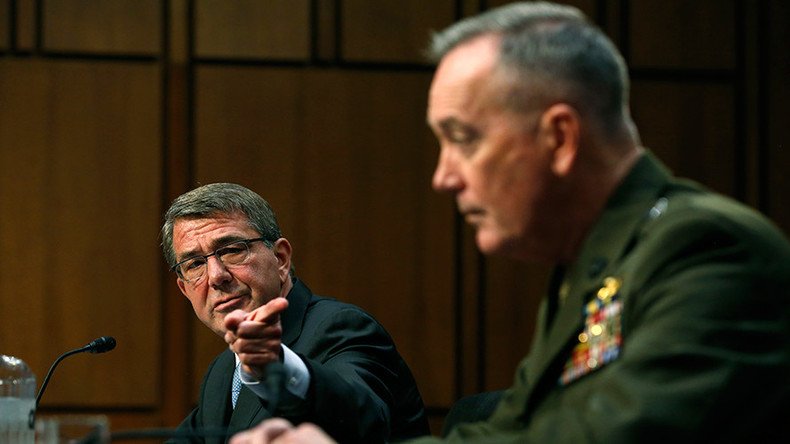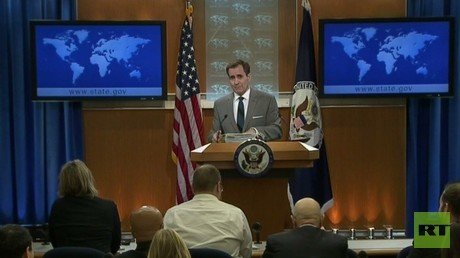'Hope is not a strategy': Pentagon chief struggles to sell ISIS plan in Senate

Top US defense officials faced Senators in an attempt to justify their strategy against Islamic State that relies on arming local forces, help from Turkey and Saudi Arabia, and some US troops on the ground. Many lawmakers didn't find it very convincing.
Defense Secretary Ash Carter and Chairman of the Joint Chiefs of Staff, General Joseph Dunford, answered a gauntlet of questions from the Senate Armed Services Committee on Thursday about the status of the US-led military effort against Islamic State (IS, formerly ISIS/ISIL) in Iraq and Syria.
Carter testified that the terror group was on the defensive, losing ground to US-backed militias and key leaders in US airstrikes. The coalition was going after IS in “every domain, including cyber and space.”
Central to US strategy was the program of arming and training local forces for ground combat, Carter explained, urging the committee to release $349 million for the program, called Section 1209. The funds were blocked following last year’s revelations about the program’s failures.
LIVE C-SPAN3 DefenseSec Carter & JointChiefs Chair Dunford Senate hearing on combating ISIS https://t.co/KHo0H1PMzXpic.twitter.com/F2UGMbdiJD
— CSPAN (@cspan) April 28, 2016
“Enabling local forces – not substituting for them – is necessary to ensure a lasting defeat” of IS, Carter testified. "And sometimes that means our pace is predicated on the speed at which local forces can absorb our enabling.” He ruled out any cooperation with the Syrian Army, however.
No Turks or Saudis, either
Committee chairman John McCain (R-Arizona) said it was “intellectually dishonest” to say an intervention force would need to be mostly American, and argued for a multinational army in which the US troops would only be a small component.
Carter, who just returned from a visit to the Middle East, said neither Saudi Arabia nor Turkey have shown any indications of willingness to host such a conventional force.
Sen. Lindsey Graham (R-South Carolina) said that he understood Turkey’s reluctance, in light of the US arming and aiding Kurdish militias in Syria allied with the PKK, which both Ankara and Washington consider a terrorist organization.
Graham also scoffed at Carter's hopes that the government in Damascus will step down in the coming months, noting that "hope is not a strategy."
Boots on the ground
Washington does have “boots on the ground” in Iraq and Syria, Carter and Dunford confirmed in answer to a question by Sen. James Inhofe (R-Oklahoma). There are 3,500 troops in Iraq, while the Special Forces contingent in Syria is about to be expanded six-fold, from 50 to 300.
Sen. Dan Sullivan (R-Alaska) criticized the White House’s insistence that those troops were “not in a combat role,” arguing that it diminished the sacrifice of the soldiers and their families.
“These people are in combat, and I think we need to say that clearly,” Carter replied.
But is it legal?
Sen. Tim Kaine (D-Virginia) brought up the legal issue of US presence in Syria, pointing out that, while Washington had been invited to Iraq by the government in Baghdad, no such invitation had been extended by Damascus.
Pentagon lawyers told him “the legal basis for what we’re doing exists in both domestic and international law,” Carter said, adding that the US was fighting terrorists and trying to “restore order and decency.”
Kaine countered that good intentions were not an excuse for violating sovereignty, and objected to using the 2001 congressional authorization to fight Al-Qaeda being used 15 years later as an “all-purpose/whenever/wherever” justification to intervene.
Poetry and math
Answering a question by Sen. Martin Heinrich (D-New Mexico) about the number of foreign fighters joining IS, Carter got poetic for a moment, saying, “Any is too many. We’re not done till there’re none.”
Earlier in the hearing, the Defense Secretary said that “90 percent of our military coalition partners – from Europe, the Gulf, Asia; 26 countries in all” have committed to increasing their contributions to fighting IS. Washington has maintained its coalition was composed of 65 nations; Carter’s math, however, added up to only 29 at best.
Regarding Assad
Several lawmakers were more interested in the prospects for regime change in Damascus, however.
Senator Roger Wicker (R-Mississippi) argued that the Syrian government, not IS, was responsible for most of the civilian casualties, and asked why the US-led coalition had not targeted the Syrian air force.
“We have not declared war on the Syrian regime, sir,” Gen. Dunford replied.
“We haven’t undertaken to change that regime by force now for a number of years,” Carter said, adding that the US strategy was to have Russia persuade the Syrian president Bashar Assad to step aside, so that the remaining Syrian government could “marry up to the moderate opposition that we support.”













